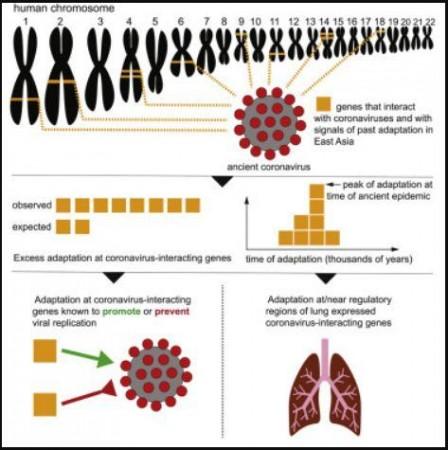Several coronaviruses such as the SARS-CoV-2, SAR-CoV, and MERS-CoV-2, among others have been known to ravage large populations across the world in recent history. However, coronaviruses—like any other pathogens—have existed for millennia and may have potentially caused epidemics and pandemics way back in human history. Offering compelling evidence for such an occurrence, scientists have found that East Asia was rocked by a coronavirus epidemic 20,000 years ago.
A new study by an international team of researchers has discovered that a coronavirus epidemic erupted in the region of East Asia over 20,000 years ago, with evident traces of the outbreak present in the genetic composition of the people in the area. The study was published in the journal Current Biology.
"The modern human genome contains evolutionary information tracing back tens of thousands of years, like studying the rings of a tree gives us insight into the conditions it experienced as it grew," explained Prof. Kirill Alexandrov, corresponding author of the study, in a statement.
Causing Mayhem Across Time

The word 'coronavirus' has become a mainstay in the common lexicon over the past nearly 19 months. However, humanity's tryst with pathogens belonging to the family of spiked viruses is not new. Throughout the course of human evolution, natural selection has favored proteins that physically interact with viruses. Accumulated evidence from studies has suggested that ancient RNA virus-caused epidemics have frequently occurred during the course of the human species' evolution.
Over the past 20 years, three coronaviruses have led to outbreaks—some more lethal than the others—of diseases among humans. The SARS-CoV, which originated in 2002, and causes SARS (Severe Acute Respiratory Syndrome) claimed over 800 lives. MERS-CoV, which was first reported in Saudi Arabia in 2012, and leads to MERS (Middle East Respiratory Syndrome) has caused over 850 deaths so far. And finally, the COVID-19 causing SARS-CoV-2, which arose in China in 2019, has killed approximately 3.8 million people across the world as of now.
For the study, the evolution of the human genome was investigated. The team utilized data from the 1000 Genomes Project comprising of 26 populations (the largest public catalogue of common human genetic variation) and analyzed the changes in the coding of human genes for proteins that interact with SARS-CoV-2. East Asian people originate from areas that are now split into China, Japan, Mongolia, North Korea, South Korea, and Taiwan.
An Ancient Epidemic

Next, the scientists synthesized proteins from both human beings and the SARS-CoV-2 coronavirus without the use of living cells. They demonstrated that these proteins interacted directly with each other. Most importantly, they particularly drew attention to the conserved nature of mechanisms used by coronaviruses to invade cells.
"Computational scientists on the team applied evolutionary analysis to the human genomic dataset to discover evidence that the ancestors of East Asian people experienced an epidemic of a coronavirus-induced disease similar to COVID-19," stated, Prof. Alexandrov. He highlighted that over the course of the epidemic, selection preferred variants of pathogenesis-associated human genes possessing adaptive changes. This probably led to less severity of the disease.
Talking about the potential of the findings in informing future research, Prof. Alexandrov, said, "By developing greater insights into the ancient viral foes, we gain understanding of how genomes of different human populations adapted to the viruses that have been recently recognised as a significant driver of human evolution. Another important offshoot of this research is the ability to identify viruses that have caused epidemic in the distant past and may do so in the future." He concluded, that this may help catalog potentially lethal viruses and develop treatment measures to counter them if they resurge.














